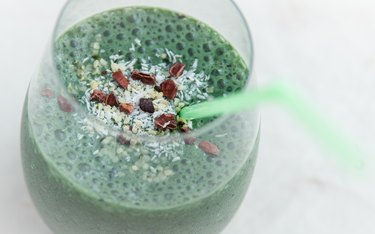
Weight gain can pose as much of a challenge as weight loss, especially if you're naturally very thin or recovering from an illness. And while weight loss and gain plans yield different results, they share some major similarities. Like losing, you want to go slowly for lasting results, and you need to make a change in how and what you eat. Adding exercise may also help you get healthier results. Talk to your doctor before you start your weight gain journey; she can design a personalized plan to help you achieve your goals.
Slow Weight Gain for Severely Underweight
Video of the Day
Be realistic when you're embarking on any weight gaining program. While a severely underweight condition is unhealthy, weight gain comes more easily to some people than others. If you've lost weight because of an illness, for example, you may find it easier to regain your weight than someone who has always been extremely thin from a naturally fast metabolism.
Video of the Day
No matter what your starting point, aim for slow and steady weight gain, not rapid results. You should expect to gain 0.5 to 1 pound weekly, so your weight gain journey may take months or even years. While gaining weight slowly requires more patience, it helps ensure a significant part of your weight gain comes from muscle instead of fat.
Concentrate on Adding Calories
Not eating enough calories may be the primary reason you're thin. The number of calories necessary to gain weight varies and depends on current intake, weight gain, activity and genetics. Add 250 to 500 calories to your current intake to start. In most cases, the extra calories may add 1/2 to 1 pound to your frame every week. However, if you're gaining too quickly -- more than 2 pounds a week -- or not gaining at all, decrease or increase your intake in 50- to-100 calorie increments, accordingly. Continue to adjust your caloric intake as needed until you reach your goal weight.
Gain Weight With the Right Foods
Eating junk such as chocolate cake and cookies adds calories but not the nutrition your body needs to gain healthfully. Include nutrient-rich high-calorie options from all the food groups to get the most nutrition out of your calorie buck. Good options include whole grains such as brown rice and quinoa, dense whole-grain bread, wheat germ, 100-percent fruit juice, dried fruit, peas, sweet potatoes and corn. Be sure to include adequate protein to support muscle growth, such as poultry, red meat, seafood, eggs, cheese, beans and soy foods. Low-fat milk and yogurt provide protein and calcium along with a few extra calories.
Use a calorie booster to add extra calories as needed. Saute veggies and meat in vegetable oil, and mix nonfat dried milk powder in hot cereal, yogurt or milk. Add calories to a fruit smoothie with nut butter, seeds or tofu.
If you're struggling with a poor appetite, split your meals up into five or six mini-meals and drink liquids in between meals to save room for food.
Strength Train to Add Muscle
You may feel exercise is counter-effective when you're trying to gain weight, but you need to work muscles for them to grow. A healthy weight-gain plan includes strength-training exercises that work out all your major muscle groups -- arms, back, shoulders, chest, abs and legs -- twice a week. Using free weights, weight machines or your own body weight, each exercise should consist of four to eight repetitions conducted two to three times. Be patient. Everyone's body type is different, and the amount of time necessary for you to gain muscle may take longer.
Aerobic exercise is also good for your health and weight-gain plan, but don't overdo it. Aim for a moderate-intensity workout, such as a brisk walk, twice a week for 20 to 30 minutes.
Tips and Considerations for Weight Gain
Eating protein at all your meals may promote on-going muscle growth throughout the day, according to a 2015 review article published in Applied Physiology, Nutrition and Metabolism. It's especially important to eat a snack consisting of carbs and protein within 30 minutes following your workout to maximize muscle growth and replenish energy stores. This snack should have a 2-to-1 ratio of carbs to protein -- for example, 15 grams of carb to 7 grams of protein. Good post-workout meal options include a glass of low-fat chocolate milk, Greek yogurt with berries or a fruit smoothie blended with tofu.
You may be tempted to turn to a weight-gain product or protein powder to assist in your efforts; however, these types of products may provide more calories than you need, up to 1,400 calories per serving. High-protein supplements also aren't appropriate for people with certain medical conditions, like kidney disease.
- Better Health Channel: Weight and Muscle Gain
- McKinley Health Center: Gaining Weight the Healthy Way
- Academy of Nutrition and Dietetics: Healthy Weight Gain
- Applied Physiology, Nutrition and Metabolism: Protein: A Nutrient in Focus
- Colorado State University Extension: Nutrition for the Athlete
- Human Kinetics: Get the Facts About Weight-Gain Powders
- QuickandDirtyTips.com: Get-Fit Guy: What to Eat Before and After Exercise